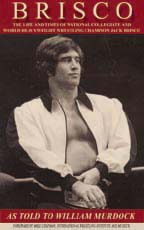Ali and Frazier. Nicklaus and Palmer. Chamberlain and Russell. For many long-time wrestling fans, you could take all three of those classic rivalries, mix them together, and they still wouldn’t equal Jack Brisco and Dory Funk Jr.

That’s why Brisco’s account of his legendary clashes with Funk – and the Funk family – assume center stage in his recently-released autobiography, Brisco: The Life and Times of National Collegiate and World Heavyweight Champion Jack Brisco.
Written with wrestling historian William Murdock, Brisco’s book is a heartfelt description of his rise from an NCAA amateur wrestling championship to the NWA world heavyweight championship – and it provides remarkable insights into the importance wrestlers of his era attached to that title.
“The ring gets in your blood and once it’s there it courses through your veins and deep into your heart,” wrote Brisco, who was NWA standard bearer from 1973 to 1975. “That is why I am happily reminded with every beat of my heart that I am, and will be as long as I breathe, a wrestler.”
Born Fred Joe Brisco – the “Jack” came from chasing jackrabbits – the Seminole, Okla. native was a stellar football player and wrestler in high school. As a senior at Oklahoma State, he captured the NCAA wrestling championship at 191 pounds.
Following the example of in-state icon Danny Hodge, Brisco turned pro after college. He hooked up with Oklahoma promoter Leroy McGuirk, and, because of his amateur success, had “star” emblazoned on him from the minute he entered his first pro match against Roger Barnes (Ronnie Garvin) in 1965.
But the most interesting revelation about Brisco’s early years in wrestling is the way in which Amarillo promoter Dory Funk Sr. repeatedly booked his up-and-coming son to squash the world-class amateur.In one of the few harsh passages in the book, Brisco believes the elder Funk laid out that program to certify Dory Funk Jr.’s otherwise-suspect amateur wrestling credentials.
“Night after night we faced each other and night after night he [Funk Jr.] would pin me in two minutes to show the world what a great amateur wrestler he was,” Brisco said.
Funk Sr. “gave me a huge build-up going in only to put Junior over as a better amateur than I was.” In fact, Brisco was so distraught about the arrangement, and the measly $25-a-night payoffs, that he contemplated retirement just two years into his career.
Brisco is quick to praise the younger Funk, who held the NWA world strap from 1969 to 1973, as an exemplary champion in and out of the ring. He heralded Funk’s championship victory over Gene Kiniski in 1969 as a generational turning point in pro wrestling.
“The era of the crew cut was over. Wrestling needed a young champion and Dory was the perfect choice,” he wrote. “In a sport controlled by huge egos, Dory put the business first.”
Still, those futile months in the Amarillo promotion clearly stuck with Brisco as he climbed the ranks in Australia, Japan, and, most regularly, Florida, where he was closely allied with promoter Eddie Graham.
In the early 1970s, Brisco regularly challenged Funk for the NWA title in what were considered the most technically superb matches of the era. By his estimate, Brisco squared off with Funk more than 200 times, often in grueling hour-long marathons. One of their bouts in 1971 was selected “Match of the Year” by leading wrestling publications, and their 1972 draw in St. Petersburg, Fla. still holds up as a classic confrontation.
When Funk’s four-year reign started to wind down in 1973, Brisco naturally assumed he was a leading heir to the throne. Graham, fresh from a meeting of the NWA board of directors, assured Brisco he would wrest the coveted crown from Funk in Houston in March 1973.
To set up his time in power, Brisco immediately started to drop closely-contested matches to hometown heroes across the country. Promoters felt those losses would ensure packed houses when Brisco returned as champion, since fans plausibly believed that the local boy could win.Days before the planned title switch, though, Funk injured his shoulder when he rolled his truck trying to round up cattle on the family ranch in Texas. Chalk up Brisco as a non-believer on that score – he is convinced that the injury was an angle set up by Funk Senior, so that his son would not lose his title clean, in the middle of the ring, to a fellow babyface.
“I am not sure if it was because he didn’t like me, the fact those years earlier that he was putting Junior over me in two minutes, my amateur background, or the fact they were Texans and I was from Oklahoma,” Brisco wrote. “Losing to a babyface would mean he lost to a better wrestler, so senior wanted him to lose to a heel so he could be screwed out of the championship.”
And though newsstand wrestling magazines were full of pictures of a hospitalized Funk, Brisco thinks those spreads were concocted, as well. “I have to be honest. I didn’t believe that story for a minute. I had enough dealings with his old man to know any time he was involved there was some game being played.”
A few months later, Funk dropped the belt to Harley Race, a heel, in Race’s hometown of Kansas City. As a result, Brisco took the losses he had purposely inflicted on himself to mean he was branded as a loser.
“The tapes of me jobbing all over the country to set up my title defenses were being shown everywhere. This was in the day when losing in the ring actually meant something. I was ranked as the number one contender but now I looked like a guy who had a great future behind him.”He need not have worried. Graham’s behind-the-scenes clout helped him to win the belt from Race in Houston in July 1973. The historic match was not videotaped, though – Brisco suspects Funk Sr. had a hand in that deficiency, as well.
Brisco held the belt for 2 1/2 years before wearying of the travel and time demanded of the champion. He did get one great payday during a tour of Japan in 1974 – he agreed to a brief title swap with Shohei “Giant” Baba for $25,000.
Not realizing that he couldn’t exit the country with that much cash, Brisco taped the money to his body, like a smuggler, as he left Japan.
Brisco remained as a headliner for the rest of his career, occasionally tagging with brother Jerry in the Mid-Atlantic promotion. He also was part of the group that sold Georgia Championship Wrestling to Vince McMahon and the WWF in 1984. His short account of what is called “Black Saturday” simply holds that he and his brother sold the promotion because they didn’t like the way it was being run.
Outside of Funk Sr., and a quick condemnation of the wild antics of The Sheik, Brisco is clearly not out to burn bridges or settle scores. The book includes a fair of amount of wrestling history that will be familiar to many knowledgeable readers. But Brisco also shuns wrestlespeak and provides enough background that outsiders can enjoy the tome.
Brisco even compliments wrestlers like Mil Mascaras and Haystacks Calhoun, who have suffered their share of barbs in other recent books. And he’s not stuck in the past – instead of scorning today’s style of wrestling, Brisco offers that it’s no better or worse than in his day – just different.
Brisco is on any short list of the greatest pro wrestlers in history. It only follows that his story is well worth reading.
